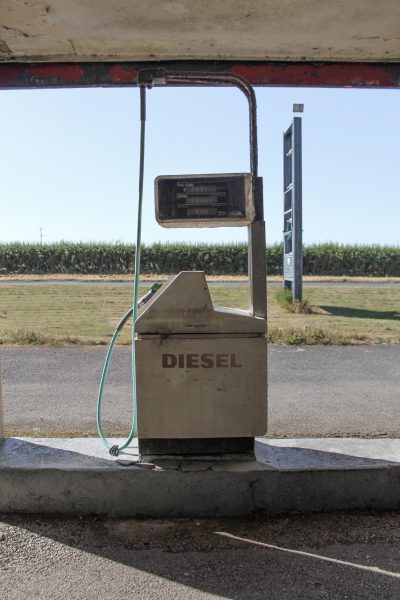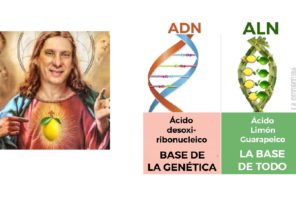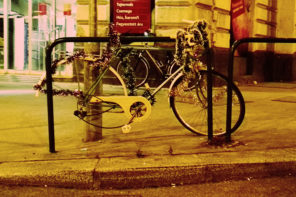In September and again in November 2015 the famous German car company, Volkswagen AG at its headquarter in Virginia, received two violation notices from the United States Environmental Protection Agency. Shortly later, the German public media drew attention to Volkswagen’s manipulation of applications for control of air pollution. Only in August 2017 did politicians sit together with the German automobile producer to discuss what by that time had become coined the “Abgasskandal” or the emission scandal. While politicians in Germany traditionally protect the car industry, they came under pressure to take measures and discuss new ways for reducing pollution, which environmental activists had long been protesting.
Meanwhile the issue was being discussed in popular media. The car drivers of concerned diesel motor cars felt “cheated” by Volkswagen as if they had not known before that diesel cars pollute much more than other cars. The town councils and district politicians were angry because Volkswagen had ridiculed the system of emission control. In short, everybody talked about the scandal from one’s own perspective. The discussion was further pushed by environmentalists who highlighted known cheating of the automobile industry at least since 2007. Thus the “scandal” could have hardly been surprising to politicians in Germany. Why did the information lead to environmental panics this time?
Whereas environmental discussions in Germany have been going on for a long time, the Abgasskandal or also the Diesel Skandal condensed the whole debate and led to moral panics. If the scandal was of juridical nature, why wasn’t it simply a matter of the court? Moral panics in the way that Stanley Cohen[1] defines them are not simply about scandals that are solved in legal procedure; they affect all levels of society and uncover social tensions. Moral panics are not only context dependent but more importantly, they are deeply rooted in cultural, social and political history. In other words, any issue in Germany that involves cars more generally becomes an issue for the whole of society.
Thus environmental issues, technical advancement, infrastructure and many other topics raise particularly emotional discussions when motorways and cars are involved.
Stanley Cohen has observed how youth gangs in the 1960s drew the attention of the media, politics and economic actors by becoming folk devils. After a serious fight between two youth gangs, the Rockers and the Mods, the media, politicians, society and economic actors overreacted with discussions and blame, a reaction that Cohen calls moral panics. But at the end of long emotional discussions in the media and politicians declaring these gangs a scandal nothing happened beyond moral panics. Cohen’s descriptions of how specific events turn into societal moral panics teaches us the need to look at scandals less through the event itself, but rather through the parties involved in making it a scandal and the social effects they have or fail at delivering. According to Cohen, moral panics develop, first, through exaggerated attention by the media, politicians and those who believe they are losing economically in the process. Second, predictions of further scandal spread fear across all levels of society, and, third, symbols emerge that mark “the devil” in the scandal. The panic culminates in political measures that have symbolic character. The scandal usually dissolves with astonishingly few solutions.
The process that Cohen has outlined can be applied to many groups and events such as migrants or non-human actors and even technologies. However, not any subject will trigger moral panics in every society, usually only subjects that touch on cultural and social sensitivities have the potential to provoke moral panics.
I use the term environmental panics as a specific form of moral panics to characterize the superficial discussions about the environment and the hype around the recent emission scandal in Germany. Environmental panics in Germany, so the argument, will always be linked to cars.
It has been well known for long that “Diesel” is a polluting fuel for cars. Germany had reacted by integrating filters on the fuel system and had established a bureaucratic system to implement environmental standards for cars. Every time a new law was passed, the press has reacted with anger and those using diesel felt their freedom restrained. In Germany since March 1st, 2007 about 55 cities have been closed to polluting cars. Each car is registered with an Umweltplakette (environmental badge) that shows the grade of pollution. Only those driving a “clean car”, that is, with an appropriate catalytic converter receive a green badge that allows the driver to enter the protected districts (usually city centers). The automobile industry had to invent technologies that could be integrated into existing cars and complained that the law would raise the prices for cars and endanger thousands of jobs. Since then, the trade with “cleanliness” between the automobile industry and politics has been going on.
The car industry enjoys a special status in German politics and society just as cars do in German families. Proverbs demonstrate the cultural relevance of the car showing that the car becomes a “competitor to the wife” and the “dearest object for a man.” One saying goes that “men pay more attention to their cars than to their own wives” and women chose a car “because it looked so sweet” while men would chose according to technical considerations. Songs and jokes specify the use of different brands, such as the “Manta” joke series of the 1980s (Opel Manta came on the market in 1970 and was a car that according to prejudices was favored by little intelligent people that like to show off). The car has a cultural place in German society linked to status and to the family. Certainly, the car is important in other societies as well. The question is whether environmental panics could develop around the car in the same way or whether other cultural sensitivities such as water supply or animals would play a more important role.
In November 2015, the United States Environmental Protection Agency based in Washington D.C. published a Notice of Violation: “As detailed in this Notice of Violation (NOV), the EPA has determined that VW manufactured and installed defeat devices in certain model year 2014 – 2016 diesel light-duty vehicles equipped with 3.0 liter engines. These defeat devices bypass, defeat, or render inoperative elements of the vehicles’ emission control system that exist to comply with CAA emission standards. […] Each VW vehicle identified by the table below has AECDs that were not described in the application for the COC that purportedly covers the vehicle. Specifically, VW manufactured and installed software in the electronic control module (ECM) of each vehicle that causes the vehicle to perform differently when the vehicle is being tested for compliance with EPA emission standards than normal operation and use.”[2] Following this Notice of Violation VW was taken to court and the enterprise was fined accordingly.

Photo by Rob Wingate on Unsplash
The media reported on the subject as “Abgasaffäre” in 2015 (not yet a scandal, just an issue, an affair). There was no serious reaction neither from the population nor from politicians or VW in Germany. Probably nobody was seriously surprised to learn that their most important industry was cheating on harsh environmental laws. The affair grew into a scandal in the media (Abgasskandal) and pressure was put on politicians to take responsibility. Politicians in Germany started to react (slowly), to call for investigations and to define whom and what was to blame. Newspapers printed the events repeatedly so that its readers could identify “the scandal”, that is, the beginning of the manipulation of the software (in 2005/2006) and the individuals that should be blamed, the economic loss and the number of jobs endangered. The population reacted angrily, developing a panic about the future of their cars, their freedom of movement and their very existence in a motorized society. In order to defuse the increasing panic and VW’s economic collapse, the automobile industry reacted by downplaying the issue. Hundred thousands of cars were called back and modernized. The costs for this action rose from 6,5 billion originally to 30 billion Euros as the case developed. The stock exchange rate collapsed within days in 2015 whereas the former leader of VW, Martin Winterkorn, refused to take responsibility and to appear in court (the US had issued an international warrant of arrest against him). He became the scapegoat against whom the new VW leadership considers a complaint.
Politicians like the Federal Minister of Economics, Sigmar Gabriel (SPD) or Minister President and VW Aufsichtsratsmitlied Stephan Weil (SPD) proclaimed that they would check on the issue. The media continued to push the issue not regarding the environment—after all this had been the key issue when the emission control had been introduced—but regarding individual responsibility and economic damage for the population. Politicians used the environment solely to to take control of the situations and set the blame on mid-level managers.[3]
The issue became more confusing and exciting as VW-files disappeared mysteriously from the state chancellery and the leadership was replaced, whereas economic loss rose astronomically. The scandal grew further, more cars were invovled, more countries complained by the end of the year 2015. Beside NOX emissions now VW “found out” that they had cheated on CO2 emissions as well, again more cars underwent control. Eventually, the EU-commission interfered and demanded information about affected cars.
VW announced that they will not pay their business tax for 2015 and since the main political fear is—not the environment but—the loss of employment, they compromise. While the case is still open in the US, efforts to obtain individual compensation in Germany have been denied by the judge. The state as the protector of the environment and of the industry has gone through the scandal without implementing any effective punishments of the leadership of VW, without promoting environmental friendly cars and the necessary infrastructure that such cars would need, without any advancement in environmental protection, and without effective protection for employment. The whole scandal resulted in nothing but environmental panics that passed as fast as they had emerged.
As the scandal developed for VW, Mercedes silently called back three million diesel-cars in July 2017 for back fitting.[4] The ‘king of the car’ in Germany, Mercedes Benz, will thus escape further blame and scandals although they probably just cheated as much as VW. But nobody wants to raise a new case and the environment has not enough agency to act, it is just a folk devil and moral challenger.
What is a technical issue in the US, is much more in Germany.
The leading newspaper Die Zeit explains “There are feelings that were hurt, a damaged of pride, the loss of innocence, even the feeling of an abrupt break of (economic) prosperity, drowned hope of future. In fact, they do not just affect the automobile industry. For Germany one can say: they concern the nation.”[5] While other affected nations to a certain degree expect the industry to cheat, in Germany people identify with the automobile industry. Many people do not believe that they cheated to any serious degree (just a bit, as all good citizens do at times). Hence the scandal is like a personal blame, a blow against national pride (“Man hat einen Teil seines Nationalstolzes von ihren Produkten bezogen, und deswegen fühlt man sich auch bei ihrer Entzauberung auf vage Weise mit blamiert, mit enttarnt und mit aufgeflogen.“) The diesel motor is directly compared to the Germans: “Everything that one can say about the German, can also be said about the diesel.”[6]
The environment (and those who defend it) have dared to challenge the golden calf of the German nation, the diesel car. Pollution was not a subject in the emission scandal, only the manipulation of technologies and this way, the unmasking of the innocence of the clean beautiful strong and trusty car. To make a gender comparison, the environmental panics of the diesel affair was the case of a rape in all its dimension: efforts to silence the shame, media that undressed the innocence, the cultural embedding of the raped, an attack on the honour of men, and finally, the unmasking of the beloved beauty.
What about the environment that is the actual victim of this environmental panics? The environmentalist movements used the scandal to mobilize against the diesel, which remains highly polluting even with filters. The government knew about the automobile industry’s cheatings but decided to protect them. The scandal was an opportunity for the environmentalists to pressure politics to act in favour of the environment.
But the media diverted the discussion from the environment to the car as the symbol of German maleness.
The Deutsche Umwelt Hilfe (DUH) went to court in 2016 to fight for a general prohibition of dirty diesel cars in cities. Although the DUH has successfully won the “right for clean air” in 2007, this right is not implemented unless through civil engagement against the state and the automobile industry.
On February 27, 2018 the Federal Administrative Court decided that cities are allowed to install prohibition for diesel cars in order to protect the air. Hamburg was the first city to implement a prohibition for older diesel cars.[7] Certain streets are now closed to such cars in order to improve the air within those neighbourhoods. Consequently, these diesel cars now use other neighbourhoods where pollution is permissible. This example shows the chaos that the diesel affair has created, the panics that were raised but politicians missed to implement a solid environmental friendly plan. Politics try to please the automobile industry and to appease the angry diesel car owners but the environment itself features as challenge to national identity, the environment is the folk devil that forces so much change in the habits of people. While environmental activists continue to call for stricter measures, the automobile industry finances tests (with monkeys and humans) to prove the diesel car’s harmlessness.[8]
[1] Stanley Cohen 2002. Folk Devils and Moral Panics. London: Routledge (third edition, first published 1972)
[2] Notice of Violation, the United States Environmental Protection Agency based in Washington D.C. Office of Enforcement and Compliance Assurance. November 2, 2015.
[3] For instance, according to the media in Braunschweig 30 managers are being legally prosecuted, whereas the authorities speak of much less.
[4] https://www.autozeitung.de/diesel-skandal-test-frontal-21-117580.html
[5] “Es sind Gefühle von Kränkung, beschädigtem Stolz, verlorener Unschuld, auch von jäh gestopptem Aufstieg, verflogener Zukunftshoffnung. Sie betreffen tatsächlich nicht nur die Automobilindustrie. Für Deutschland kann man sagen: Sie betreffen die Nation.“
[6] „Alles, was sich über Deutsche sagen lässt, kann man auch über den Diesel sagen.“
[7] „Hamburg führt als erste Stad Fahrverbote von Diesel-Fahrzeugen ein.“ Stern, May 23, 2018,
[8] „Diesel-Skandal: Abgas-Tests mit Affen und Menschen – VW, Daimler und BMW.“ FOCUS, January 29, 2018,









